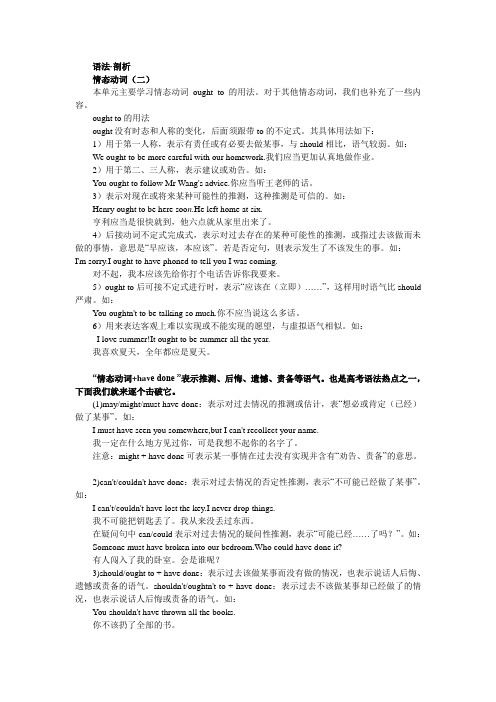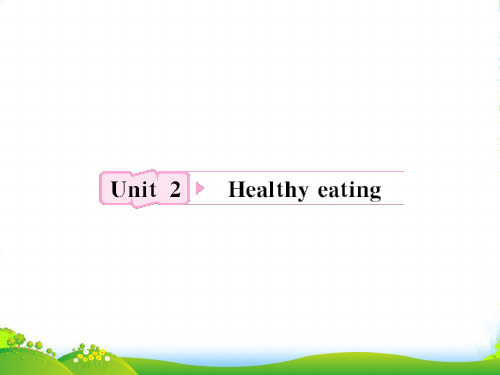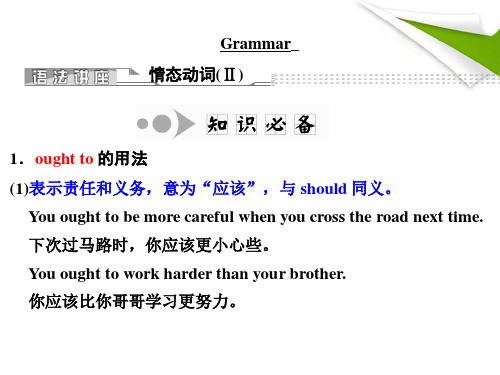人教新课标必修三 Unit 2 Healthy eating情态动词讲解
- 格式:ppt
- 大小:369.00 KB
- 文档页数:24

教学过程一、复习预习依据语境记词汇单词拼写1.Don’t glare (怒视) at me like that; you deserved the scolding.2.The patient is recovering slowly; therefore, you had better choose some foods which digest (消化) more easily.3.This shop tries its best to meet the needs of its customers (顾客).4.This kind of fish d oesn’t need to be cooked.It can be eaten raw (生的).5.If you place orders now, we would give you a 5% discount (折扣).语境填词(用所给词的适当形式填空)1.Children are always curious about everything they see and hear.They will ask all kinds of questions curiously.To meet their curiosity,_we’d better answer them.(curiosity) 2.This new railway benefits this area in many ways.It is beneficial to the people living in this area.For the benefit of more people, we should build more railways.(benefit)3.The man looks strong,_but he hasn’t enough strength to lift the heavy box.He needs to strengthen his body.(strength)二、课堂导入复习上节课情态动词概念概念:在动词(一般动词)之前形成动词的否定,疑问,时态,语态,语气或表示特殊意义的动词叫做助动词,其中具有感情色彩一些助动词叫做情态动词。

语法归纳之情态动词情态动词有can (could), may (might), must, have to, shall (should, will (would), dare (dared), need (n eeded), ought to等。
情态动词无人称和数的变化;不能单独使用,必须与其后的动词原形构成谓语。
一、can, could1)表示能力(体力、知识、技能)。
Can you lift this heavy box?(体力)Mary can speak three Ian guages.知识)Can you skate?(技能)此时可用be able to代替。
Can只有一般现在时和一般过去式;而be able to则有更多的时 ^态。
I ' ll not be able to come this after noon.当表示经过努力才得以做成功某事”时应用be able to,不能用Can。
如:He was able to go to the party yesterday eve ning in spite of the heavy rain.2)表示请求和允许。
---- C an I go now?——Yes, you can. / No, you can ' t.此时可与may互换。
在疑问句中还可用could,might代替,不是过去式,只是语气更委婉,不能用于肯定句和答语中。
----Could I come to see you tomorrow?——Yes, you can. ( No, I 'afnaid no t.)3)表示客观可能性(客观原因形成的能力)。
They' ve cha nged the timetable, so we can go by bus in stead.This hall can hold 500 people at least.4)表示推测(惊讶、怀疑、不相信的态度),用于疑问句、否定句和感叹句中。

语法·剖析情态动词(二)本单元主要学习情态动词ought to 的用法。
对于其他情态动词,我们也补充了一些内容。
ought to的用法ought没有时态和人称的变化,后面须跟带to的不定式。
其具体用法如下:1)用于第一人称,表示有责任或有必要去做某事,与should相比,语气较弱。
如: We ought to be more careful with our homework.我们应当更加认真地做作业。
2)用于第二、三人称,表示建议或劝告。
如:You ought to follow Mr Wang's advice.你应当听王老师的话。
3)表示对现在或将来某种可能性的推测,这种推测是可信的。
如:Henry ought to be here soo n.He left home at six.亨利应当是很快就到,他六点就从家里出来了。
4)后接动词不定式完成式,表示对过去存在的某种可能性的推测,或指过去该做而未做的事情,意思是“早应该,本应该”。
若是否定句,则表示发生了不该发生的事。
如:I'm sorry.I ought to have phoned to tell you I was coming.对不起,我本应该先给你打个电话告诉你我要来。
5)ought to后可接不定式进行时,表示“应该在(立即)……”,这样用时语气比should 严肃。
如:You oughtn't to be talking so much.你不应当说这么多话。
6)用来表达客观上难以实现或不能实现的愿望,与虚拟语气相似。
如:I love summer!It ought to be summer all the year.我喜欢夏天,全年都应是夏天。
“情态动词+hav e done ”表示推测、后悔、遗憾、责备等语气。
也是高考语法热点之一,下面我们就来逐个击破它。
(1)may/might/must have done:表示对过去情况的推测或估计,表“想必或肯定(已经)做了某事”。



高中英语学习材料madeofjingetiejiUnit 2 Healthy eating 课文知识点解析Reading:Come and Eat Here(Ⅰ)1.Wang Pengwei sat in his empty restaurant feeling very frustrated.王鹏伟坐在他空荡荡的餐馆里,感觉很失落。
feeling现在分词,作伴随状语。
e.g.Standing on the top of the hill,you can have a better view of the city.站在山顶上,你能更好地看到这个城市.Jeff shouted,seizing her arm.杰夫抓住她的胳膊,喊叫着。
Seeing from the top of the hill,we can see the whole city. 从山顶上我们可以看到整个城市.2.He thought of his mutton kebabs and fatty pork cooked in the hottest,finest oil.他想到了他的在热的最好的油里炸出来的烤羊肉和肥肉。
cooked 过去分词短语,作后置定语(被动)。
e.g.I know a girl called Mary.我认识一个叫玛丽的女孩。
English is a language spoken all around the world.英语是全世界都说的一种语言。
3.His fried rice was hot but did not taste of fat.他的热而不腻的米饭。
taste of sth. 有某种味道e.g.It tastes strongly of mint.它有挺重的薄荷味。
taste 能辨别(味道);尝出,品出。
(不用于进行时,常与can连用)e.g.I can’t taste.I’ve got a cold.我得了感冒,尝不出味来。
【本讲教育信息】一、教学内容必修3 Unit 2 Modal verbs (2) 情态动词(2)ought to / ought not to /have to / don‘t have to / mustn‘t /need/needn‘t / 情态动词+ have done二、知识精讲(一)ought to/ought not toought to意为“应该,应当”,是情态动词,没有人称和时态的变化,与should同义,语气较强。
例:You ought to obey your parents.你应该听父母的话。
You oughtn‘t/ought not to blame him.你不应该责备他。
—Ought I to go? 我该去吗?—Yes,you ought to. 是的,你应该(去)。
1. 表示职责和义务She ought to look after her children better.她应该把自己的孩子照顾得好一些。
Humans ought to stop polluting nature.人类应该停止污染大自然。
2. 表示建议和劝告We really ought to buy a car, oughtn‘t /shouldn‘t we?我们真该买辆车了,是吗?You ought to obey your parents.你应该听父母的话。
3. 表示猜测,可能性较大He ought to be here soon – he left home early.他应该快到了——他很早就出门了。
The seats ought to be enough for all the guests.这些座位应该够所有客人使用了。
知识拓展辨析:ought to/should一般说来,两者可互换,只是ought to语气略强。
另外,表示出于法令规则、行为规则、道德责任等客观情况而“应该”做某事时,一般应用ought to;若用should则含有个人意见,强调主观看法。
教学过程一、复习预习依据语境记词汇单词拼写1.Don’t glare (怒视) at me like that; you deserved the scolding.2.The patient is recovering slowly; therefore, you had better choose some foods which digest (消化) more easily.3.This shop tries its best to meet the needs of its customers (顾客).4.This kind of fish d oesn’t need to be cooked.It can be eaten raw (生的).5.If you place orders now, we would give you a 5% discount (折扣).语境填词(用所给词的适当形式填空)1.Children are always curious about everything they see and hear.They will ask all kinds of questions curiously.To meet their curiosity,_we’d better answer them.(curiosity) 2.This new railway benefits this area in many ways.It is beneficial to the people living in this area.For the benefit of more people, we should build more railways.(benefit)3.The man looks strong,_but he hasn’t enough strength to lift the heavy box.He needs to strengthen his body.(strength)二、课堂导入复习上节课情态动词概念概念:在动词(一般动词)之前形成动词的否定,疑问,时态,语态,语气或表示特殊意义的动词叫做助动词,其中具有感情色彩一些助动词叫做情态动词。
Unit2 Healthy eating语法篇__________________________________________________________________________________ __________________________________________________________________________________要求学生掌握本单元的重点语法----情态动词表示推测的用法。
一、情态动词表推测:1. 大多数情态动词(除表‘能力、许可、意志’外),都可以表示推测,其程度有差异。
按可能性程度的高低排列为:must ﹥will ﹥would ﹥ought to ﹥should完全肯定完全可能很可能﹥can ﹥could﹥may ﹥might可能有可能2. 区分情态动词的否定含义:may not或许不、可能不might not可能不can’t 不可能mustn't不许、禁止shouldn’t不应该needn’t 不必3. 情态动词表推测具体运用:情态动词可以对现在、进行、过去推测。
4. 表示反劝的特殊的表推测形式5. 注意:二、情态动词表推测的反意疑问句1.情态动词表推测的反意疑问句,简单来说,就是以情态动词后的时态为淮,如句子里有明确的时间状语,则以其为准。
2.以must 为例:Eg.1. You must be hungry now,aren’t you?2. He must be watching TV,isn’t he ?3 Tom must have lived her for a long time,hasn’t he ?4. She must have arrived yesterday,didn’t she?注:如选择题中(以She must have arrived yesterday,didn’t she?为例)既有didn’t she又有hasn’t she则以didn’t she?为最佳答案。
Unit2 Healthy eatingⅠ。
单句语法填空1.Many people have come to realize that they should go on __a__ balanced diet and make room in their day for exercise。
解析:句意:许多人已经意识到他们应该保持平衡的饮食,而且每天留时间进行锻炼。
a balanced diet平衡的饮食。
2.—How was your recent trip to Sichuan?—I've never had a __more__ pleasant one before.解析:考查形容词的比较级。
句意:—-你最近去四川的旅行怎么样?——这是让我最为愉快的旅行了。
否定词never与比较级a more pleasant构成最高级的含义。
3.—In this day and age,women can have children and jobs as well。
—I can't agree more。
It’s great to have the two__combined__(combine).解析:句意:——在现在这个年代,妇女可以兼顾养育子女与工作.-—我非常同意。
把这两者结合起来是非常棒的。
4.Since nobody gave him any help, he __must__ have done the research on his own.解析:本题考查情态动词的用法。
句意:因为没有人帮助他,他一定是自己独立完成的研究。
must have done表示对过去事实的肯定推测.5.While prices are rising so fast,many people are working out ways to cut__down__their expenses.解析:句意:当价格飞涨时,许多人做出了削减费用的举措。